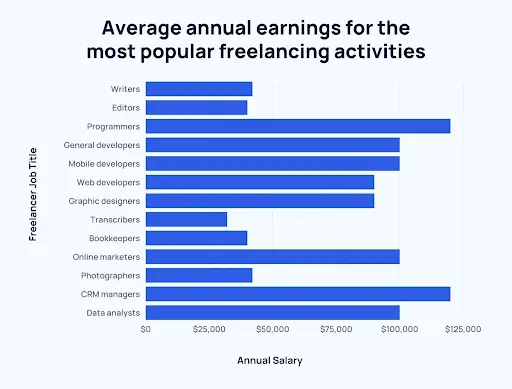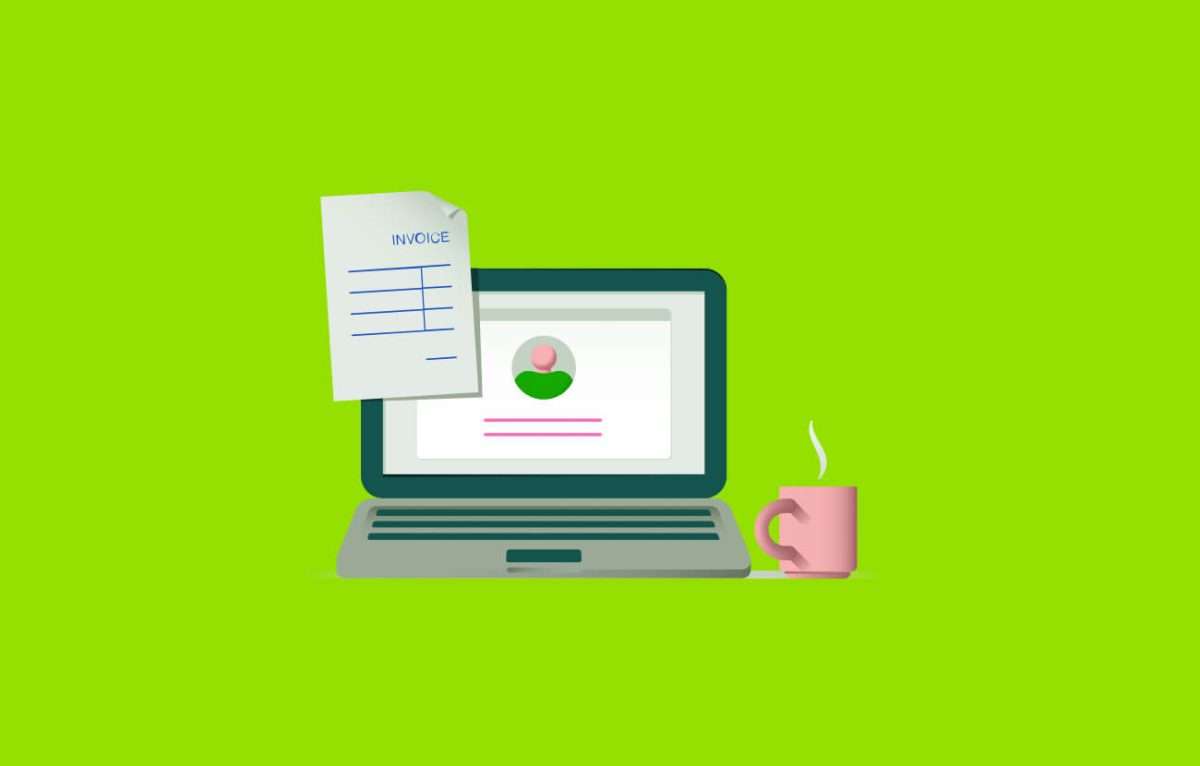Is freelancing right for you? You’ll find out soon in this comprehensive post.
It’s not a mistake if you are considering freelancing in Nigeria.
Data from the World Bank reveals that nearly 47 percent of workers worldwide are freelancers. So, you won’t be alone if you take this career path. And it’s also financially rewarding.
The total yearly earnings for freelancers in the United States alone is around $1.3 trillion, which is about four times the Nigerian GDP. And if you target the U.S. freelance market as a programmer, data analyst, or mobile developer, you can expect to make up to $120,000 annually.
Recommended For You: Learn everything you need to know about applying for the Tony Elumelu Entrepreneurship Programme, writing a stand out proposal, and winning the $5,000 grant. We even included a TEEP application checklist to help you stay on track. Start Your Journey Now
Copywriters, who are the most common freelancers in Nigeria, often take home an average annual earnings of $50,000, while graphic designers and web developers earn between $75,000 and $100,000 yearly.

This is a whole lot of money if you convert to Naira.
But freelancing is not for everyone. And in this post, you’ll learn if it’s right for you.
So, let’s begin.
Table of Contents
Key Takeaway (Editor’s Picks)
- Freelancers make up nearly half of the global workforce.
- Freelance writers in the U.S. can earn up to 50 million Naira yearly, while programmers and mobile developers make more than double that.
- Freelancing offers more freedom and work flexibility.
- Scaling freelance earnings in Nigeria is easier than getting a pay raise.
- Freelancers enjoy greater job security.
- As a freelancer, you’ll get more opportunities to develop your skills than when working full-time.
- You’ll struggle as a Nigerian freelancer if you don’t have a steady power supply.
- Freelancing is highly competitive, so you might struggle to get clients if you lack marketing skills.
- You’ll be in charge of everything, which can make freelancing overwhelming.
- Hiring virtual assistants or automating repetitive tasks can make freelancing more seamless.
Now, let’s get started.

Top 5 (+3) freelancing platforms for Nigerians
What are the best freelancing platforms for Nigerians? I’ve put together the top eight. Check out my list and see which one is right for you.
Pros: Why Freelancing Might Be Right For You
Here are the top benefits of freelancing in Nigeria and why you should consider it today:
Low startup cost
Freelancing doesn’t require too much upfront investment.
You can begin once you have a laptop, internet connection, and reliable power supply. Also, you don’t have to worry about securing and furnishing an office space as you can work from anywhere. I started from a corner of my bedroom before getting a home office.
I think besides my laptop, the only thing starting a freelancing business in Nigeria cost me was the price of a portable generator, plastic table, and LED table lamp I bought on Jumia to illuminate my work space.
I bought my office chair a year later and moved to my home office the following year.
The bottom line is I started freelancing with nothing and built a financially rewarding business in less than two months. You can read more of our freelancing stories below:
- I’ve Being Working from Home Since 2016, Here Are 7 Things You Should Know About As You Transition to Remote Work in Nigeria
- How I Became a Freelance Writer on Fiverr Getting Paid to Write, Living the Laptop Lifestyle & Working From Home Fulltime
- 4 Harsh but Valuable Lessons I Learned From Starting My Business
Why freelancing is right for you: Nigeria is an expensive place to start a physical business. So, freelancing can save you these costs as you can work from home.
More freedom and flexible working hours
Freelancing gives you freedom over many things.
For example, you can set your rates, choose the clients you want to work with and create your own company culture. You can also set your schedule and work hours, which means you’ll have more time for yourself, your family, and your hobbies.
As an active freelancer in Nigeria, I wake up to work not to go to work.
Because of my flexible working hours, I wasn’t scared that my then pregnant wife might go into labour while I was at work. I don’t worry about missing events due to work commitments. And I am not scared to travel anything I want.
You don’t enjoy these while working full-time, not even as a senior staff.
Why freelancing is right for you: Shuttling between home and work and vice versa, five times weekly can drain your pockets heavily. Also, you can’t travel for emergencies without answering queries. But you don’t have to worry about these as a freelancer in Nigeria. You own your time.
Easily scalable earnings
Scaling your earnings is more effortless as a freelancer.
You can easily adjust your rates over time as you gain experience, build your portfolio, and deliver more value to clients. Also, you can improve your earnings by taking in more clients and upselling existing ones.
But negotiating for a pay raise in Nigeria is tricky.
I never got one throughout the period I worked full-time. Rather, my pay was decreased twice due to the COVID-19 pandemic. The last was what made me dump full-time employment for freelancing.
And I have never regretted it.
I made more in the first month than I ever earned in a single month working full-time.
Why freelancing is right for you: You might need to wait for ages to get a pay raise in Nigeria, especially as a private company employee. That’s besides the fact that most Nigerian employees are underpaid. But it’s easier to scale your earnings as a freelancer.
Opportunity for skill development
Another perk of freelancing is that you’ll have plenty of time to upskill.
You can always make time for training and courses if you want to. The more you develop yourself and specialize, the more value you can offer clients, which will lead to more earnings.
Besides learning on the job, you’ll have little opportunity to pursue specialized training as a full-time worker. I couldn’t even complete one course during my time—I think on Frictionless Sales.
But since I started working remotely, I’ve been able to complete several certification courses, like Sales Enablement, Search Engine Optimization, and Social Media Marketing. I’ve also learned a ton from working with clients all over the world, making me versatile and competitive.
I don’t think I would have had the same opportunities if I was still working full-time in Ikeja.
Why freelancing is right for you: Working eight to six weekly, leaves you with little time for training to improve your skills. Which makes you expendable. Freelancers have more control of their time which allows them to invest in skill development, making them more competitive.
Job security
Over 90 percent of our staff members lost their jobs during the COVID while still in Ikeja.
I was lucky to keep my job.
A few years ago, I worked as a Communication Executive at a facility management company in Lagos Island. It was a wild ride. In the three months I worked there, I saw nine employees get fired or quit. I was the tenth. I lost my job for extending my sick leave by just one day.
These are some of the sad realities of working full-time in Nigeria.
But with freelancing, you won’t at least worry about getting a sack letter. Your only worries will be on upskilling, exceeding client expectations, and getting more customers.
I rather worry about that than about how to keep my job.
Why freelancing is right for you: Little things can make you lose your job in Nigeria—coming to work late due to traffic, new government policy, complaining about late salary payment, unreasonable KPIs, and more. But only you can sack yourself as a freelancer.
Cons: Why Freelancing Might Not Be Right For You
Freelancing has its downside. Here, we will consider some of the disadvantages and why it might not be right for you in Nigeria.
You’re in charge of everything
Freelancing in Nigeria is not an easy ride.
You’re in charge of everything and this could be overwhelming. Dealing with clients and managing their expectations is already a handful. Now imagine combining this with marketing, including client sourcing and retention, managing your finances, and performing administrative tasks.
But you don’t have to worry about all these as a full-time employee.
Why freelancing might not be right for you: With freelancing, you’re in charge of every aspect of your business. It’s not right for you if you lack the mental stamina to handle so many tasks alone.
But, you can outsource the ones you can’t handle comfortably to other freelancers (virtual assistants) or at least, automate them with apps. We have four other freelancers working on our team.
It’s not easy to get clients
Freelancing is competitive due to its low entry barrier.
There are a ton of freelancers out there competing for the same clients as you. In the UK alone, there are 4.2 million of them! And then there are another 3 million in France, Germany, and Spain. So, you’ll need to roll up your sleeves to stand out.
And that’s where marketing skills come in. But a lot of freelancers struggle with that.
Another challenge is that most clients look at reviews and portfolios before hiring a freelancer. So, as a beginner, you might struggle to land gigs.
Why freelancing might not be right for you: Getting clients is not easy. So, don’t go into freelancing if you lack marketing skills.
You won’t get typical employee benefits
Employee benefits are some of the perks of working full-time.
But as a freelancer, you’re on your own when it comes to things like paid leave, health insurance, and retirement savings. You’ll have to figure out how to get those things for yourself, which can be a challenge.
I used to get weekly treats when I worked full-time at the Island.
But today, I pay for every treat I want, which is sometimes expensive. Again, I don’t expect money whenever I go on leave, unless for work already done. So, I always travel with my laptop.
Why freelancing might not be right for you: You won’t receive work benefits full-time employees enjoy. Freelancing is not right for you if you care so much about these benefits.
It could be expensive to power your business
Freelancing strives for a steady power supply.
But, it’s not a secret that electricity from the national grid is unreliable. So, you’d need to source for alternatives to keep your work going. And they don’t come cheaply.
Electricity is probably going to be your biggest challenge as a freelancer in Nigeria. Of course, generators can help, but you can’t bank on them 100 percent. Before switching to solar energy, mine—two generators—sometimes break down at inopportune times, when I have deadlines to meet.
Again, I can’t run the generator beyond 11 PM because of the noise, which means I have to stop work even when I don’t feel like, which limits my productivity.
Also, the money that goes into servicing the generators and keeping them in great shape is huge.
Why freelancing might not be right for you: Depending only on the national grid for electricity is risky. So, don’t go into freelancing if you can’t guarantee reliable electricity.
How to Know If Freelancing Is Right For You
So, we’ve talked about the pros and cons of freelancing, and what makes it a good or bad fit for you. But is freelancing right for you? Take this 60-seconds quiz to find out.
Freelancing Vs Full Time Job
Here, we will compare freelancing and full-time employment to provide you with more insights on whether it’s right for you.
| S/N | Features | Freelancing | Full-Time Job | Notes | Winner |
| 1 | Boss | ✔️ | ✖️ | You’re your own boss as a freelancer, while full-time employees work under a boss. | Freelancing |
| 2 | Flexible working hours | ✔️ | ✖️ | Full-time employees have set work hours, while freelancers enjoy flexible work schedules. | Freelancing |
| 3 | Flexible workplace | ✔️ | ✖️ | You can work from anywhere as a freelancer. But your employer expects you to come to the office as a full-time employee. The best you can get is a hybrid arrangement where you can share between working from home and the office. | Freelancing |
| 4 | Progressive earnings | ✔️ | ✔️ | Fulltime employees and freelancers can earn more with time and as they get more experience. But, freelancers enjoy more scalable earnings as they can adjust their rate and workload to earn more | Freelancing |
| 5 | Specialized roles | ✖️ | ✔️ | You’ll handle every aspect of running the business, unlike full-time employees who have specialized roles. | Full-time employment |
| 6 | Job security | ✔️ | ✖️ | Freelancers enjoy greater job security than full-time employees | Freelancing |
| 7 | Employment benefits | ✖️ | ✔️ | You won’t get any work-related benefits as a freelancer. | Full-time employment |
| 8 | Professional network | ✔️ | ✔️ | You can build professional networks as a freelancer and full-time employee. But it’s easier with the latter. | Full-time employment |
| 9 | Steady paycheck | ✖️ | ✔️ | Freelancers don’t enjoy steady paychecks like full-time employees. This predictability can help them manage their finances better. | Full-time employment |
| 10 | Work-life balance | ✔️ | ✖️ | Freelancing gives you greater control over your time and schedule, allowing you to balance work and life. | Freelancing |
| 11 | Career growth | ✖️ | ✔️ | Full-time employees have a predictable career path, allowing them to grow within the organisation. | Full-time employment |
Let’s Help You Find Freelance Work
We’re here to help you make the jump into freelancing, whether you want to do it full-time or part-time. We regularly publish articles and tips that can help you find freelance work, retain your clients, scale your business, and build your personal brand as a freelancer in Nigeria.
We also have free resources like free checklists and toolkits that can help you grow.
But first, check out our comprehensive article on selecting the right freelancing platform. And don’t forget to download the free freelancing checklist to begin your journey as a freelancer in Nigeria.
FAQs
Is freelancing lucrative in Nigeria?
Yes, freelancing can be very lucrative in Nigeria.
There are many opportunities for freelancers in a variety of fields, including writing, web development, graphic design, programming, and data analysis. Freelance rates in Nigeria are also competitive which makes Nigerian freelancers attractive to foreign clients.
However, it is important to note that freelancing is not without its challenges. It can be difficult to find clients, and it can be challenging to manage your time and finances effectively.
How do I get started as a freelancer?
If you are thinking about becoming a freelancer, here are a few things you can do to get started:
- Develop your skills and get relevant experience.
- Build a portfolio of your work to show potential clients.
- Market your services and start networking with potential clients.
- Determine your rates and be prepared to negotiate with clients.
- Find alternative energy sources to ensure steady electricity.
What are some tips for success as a freelancer?
Here are a few tips for success as a freelancer:
- Be professional. Always act professionally with clients and colleagues.
- Be reliable. Meet deadlines and deliver high-quality work.
- Be flexible. Be willing to adapt to changes and take on new challenges.
- Be persistent. Don’t give up easily.
- Be positive. Maintain a positive attitude and be enthusiastic about your work.
What are some resources for freelancers?
There are many resources available to help freelancers, including:
- Freelance websites. Several websites connect freelancers with clients.
- Freelance blogs. Several blogs offer advice and tips for freelancers.
- Freelance books. There are several books that offer guidance on freelancing.
What kind of freelance work can I do?
There are many different types of freelance work that you can do. Here are a few examples:
- Writing: You can write articles, blog posts, e-books, and more.
- Editing: You can edit articles, blog posts, e-books, and more.
- Proofreading: You can proofread articles, blog posts, e-books, and more.
- Graphic design: You can create logos, websites, and other visual content.
- Web development: You can develop websites and web applications.
- Social media marketing: You can create and manage social media campaigns.
- Content marketing: You can create and manage content marketing campaigns.
- Email marketing: You can create and manage email marketing campaigns.
- Project management: You can manage projects for clients.
- Virtual assistant: You can provide administrative support to clients.
- Customer service: You can provide customer service to clients.
- Sales: You can sell products or services to clients.
Is Freelancing Right For You? Now, What Next?
Freelancing can be a great way to have more control over your work-life balance and earn a good living.
However, it’s not for everyone. But with the tips here, you can find out if it’s right for you. If you’re a good fit, recommend our article on selecting the right freelancing platform to enable you to begin right away.
Additionally, ensure you have the skills and experience that are in demand by potential clients. Also, Network with other freelancers and professionals in your field. This will help you find work and learn from others who are already freelancing.
You can also create a website or online portfolio to showcase your work.

